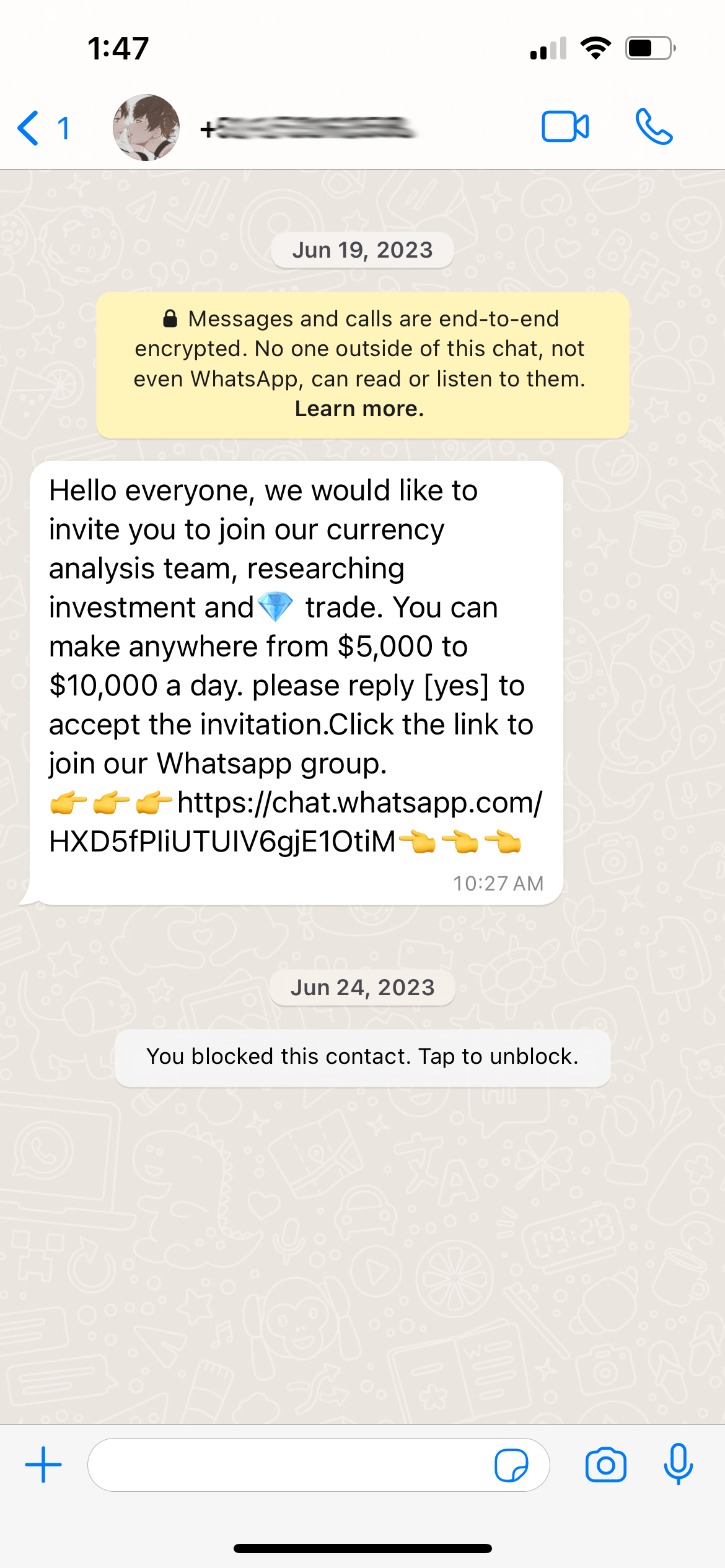
When you think of online scams, you probably picture an e-mail prompting you to give your banking information to get a refund, or wanting to send you part of the inheritance from a distant uncle you didn’t know existed. But with advancements in AI and technology, scammers are becoming more sophisticated, such that it can be difficult to discern between a legitimate missive or phone call and a fraudulent one. What’s more, scams aren’t just limited to e-mails or phone calls anymore: cyber criminals are reaching out through smartphone messaging and even other connected products, like your smart TVs.
Being aware of the most common types of online scams is your first line of protection against scammers, so this article will cover some of the most popular scams to look out for in 2024. You can also use software included in Best Buy Membership to help thwart attacks and protect your personal information. Best Buy Geek Squad Agents are also trained to help you avoid the latest scams, so you can reach out to an Agent to learn about how to best protect yourself.
Top 2024 scams to know about
First, beyond the usual scams you’re probably already familiar with, it’s important to familiarize yourself with some of the latest, most prevalent (and dangerous) scams.
Deepfakes
You might have seen incredible deepfakes, like the man who was able to transform himself into actor Tom Cruise and fool many before revealing the truth. But Deepfake scams don’t just use AI for visual purposes. They can also use voice. A particularly talented scammer could call you, for example, and pretend to be a friend or family member, saying they’re in trouble.
They use snippets of the person’s actual voice gathered from the web to recreate sentences this person didn’t actually say and make you think you’re speaking to someone you’re not. With a sample piece of media, an algorithm can be trained to replicate this person’s voice (or face) and create sentences and words they aren’t actually saying. Deepfake fraud is one of the most dangerous types nowadays, which can be used to scam people out of personal information and money.
Social Engineering

Another type of scam that is growing in popularity is called Social Engineering. It’s quite simply the act of manipulating people in a variety of ways, convincing them to divulge personal information that can then lead to identity fraud or stolen money. At the crux of social engineering is the fact that no sophisticated software is needed: scammers simply prey on a person’s natural inclination to be trustworthy.
It could be something as simple as social media quizzes that tell you who your celebrity lookalike is, for example, or what type of person you are. Asking for seemingly harmless information like your astrological sign or the name of your first pet is a clever way to get details like your bank code, birth date, or security passwords.
Phishing attacks are a popular type of social engineering. These usually involve a sense of urgency, like telling you that a package is stuck at customs and you need to click a link immediately to verify your mailing address or pay duties to have it released. Since online deliveries are so common, even the most diligent people can be fooled. If the link asks you to log into your account, scammers instantly get your personal login details, which they can then use for fraudulent purposes. These e-mails may also purport to come from your bank, school, popular company like a streaming service, or even a charity.
Job listings scams
Job listing scams are becoming more prevalent as well, especially with the volatile job market. Scammers prey on those who are desperate to find work, or eager to switch career paths by offering what appear to be can’t-pass-up opportunities. These scams might be fake job listings that promise special training and education for an enrolment fee, or an outright job offer delivered by e-mail, text message, or a messaging app like WhatsApp.

The person introduces themselves, purporting to be from a specific company or recruitment organization, asking you to reply to get more details. Once they have you hooked, they can manipulate you into providing personally identifiable details, potentially even money in exchange for job training or recruitment assistance. I receive at least one message like this per week, usually via messaging platforms.
Grandparents’ scams
Perhaps the most egregious of them all are grandparent scams, which involve the most vulnerable and least tech-savvy subset of the population: senior citizens. These scams can involve everything from deepfakes claiming to be a child or grandchild in trouble, to fake calls claiming to be the government or even the police. Scammers create a sense of urgency then patiently walk the senior through the process of sending money via wire transfer, in person at the bank, or might even send someone to pick it up. In some cases, they accept gift cards or crypto currency, preferred since these methods of payment can’t be traced. Before the unsuspecting senior realizes it’s a scam, it’s too late.
Tips on how to protect yourself
There are simple tips you can follow to help protect yourself against scammers.
Proceed with caution
When it comes to protecting yourself against online scams, the most important thing is to be cautious. If you receive a call or e-mail from someone, ask them a specific question to which only you and that other person would know the answer. If they can’t answer it, that’s a red flag it’s not real. When I was a child, my mom gave me a special code word to use as a verification tool, which is another potential strategy to consider, especially with scams like deepfakes. If the e-mail, text message, or social media post seems to be offering a killer deal, as the saying goes, if it seems too good to be true, it probably is.
Never click links or downloads

Don’t click on links or download attachments in e-mails unless you are 100% certain that they’re safe and it’s from the real sender. If it’s presumably from your bank or an account to which you subscribe, leave your e-mail program and log in directly to that account from another browser window. From there, verify if there’s anything that needs to be tended to. Even if the e-mail was legitimate, handling it this way protects you from the chance that it isn’t.
Perform a secondary verification
Always do a secondary verification. You can do that via the same method noted above, by visiting the secure website for a service or company to see if anything is amiss. You can also reach out to customer service to verify the authenticity of the phone, text, or e-mail message. Chances are, you’ll learn that it isn’t legitimate.
Set up e-mail filters
A simple e-mail filter can remove scams and junk mail from your inbox. Check the filtered e-mails periodically to make sure nothing was captured by mistake. But in most cases, if an e-mail was filtered as junk or spam, it probably is.
Analyze the message
A good indication that a message isn’t legitimate is in the wording or URL links. Sometimes, the address shown does not direct to the company’s legitimate website. This is a good indication that the e-mail is not authentic. In one of the above examples, the URL provided to supposedly verify my PayPal account details is clearly not affiliated in any way with PayPal.
Second is wording. Since scams can sometimes (though not always) originate from foreign countries where English is not a first language, the wording, grammar, punctuation, and/or spelling might be incorrect. For example, in one of the message captures provided above, you can see that the person wrote “If you are interested? Reply for details!” The incomplete sentence is a good indication that it isn’t real.
Check in on and educate elders
Educate your elders (and kids) on the types of scams that exist and how to handle them. Ask them to forward suspicious e-mails to you before clicking on links, advise them to never accept friend requests from social media accounts unless it’s someone they know and they can confirm the person legitimately sent it, and get a contact phone number if someone calls claiming there’s an urgent matter. Hang up and call the organization or person they claim to be, whether it’s the local police department, hospital, business, or even family member or friend, and verify it really was them before proceeding further.
Report nefarious e-mails, phone numbers, and social accounts
Report accounts, e-mail addresses, or phone numbers to the appropriate places. Social media sites like Instagram have an option to block a specific sender or even report them. Scammers are usually one step ahead and will simply close an account or e-mail address and open another before anything can be done. But the more people who continue to do this, the fewer times people will get duped.
How Best Buy can help

Best Buy’s Geek Squad team is always available to help customers with all sorts of tech needs, including protecting you against online scams. With a Best Buy Membership, for example, you get security software downloads for all your computing devices, which includes virus protection, Bitdefender or McAfee Internet Security, and 1TB of cloud back-up. Work with Geek Squad Agents to help you install everything, too, in store, remotely, or even at your home.
A Best Buy Membership includes ‘round-the-clock support, so if you feel like you could be victim of a scam, an Agent can help. If you’re already a Member, connect with an Agent online today to discuss how you can best protect your personal information. Not a Member yet? Sign up for a Best Buy Membership online or in-store to enjoy virus and data protection, and many more benefits.





